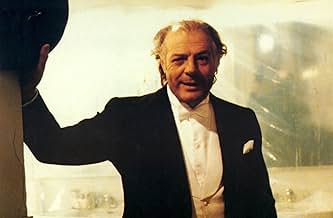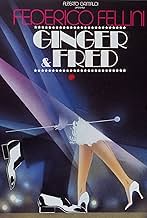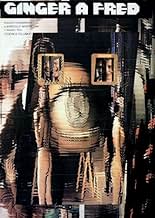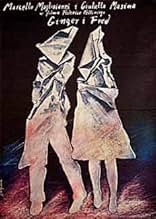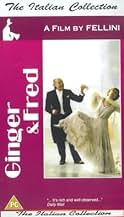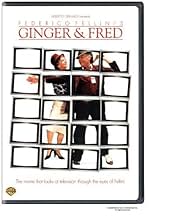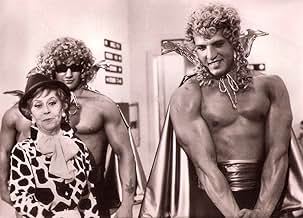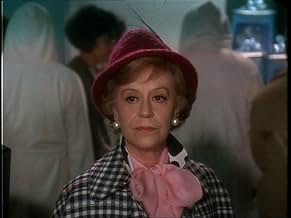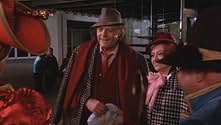CALIFICACIÓN DE IMDb
7.2/10
5.8 k
TU CALIFICACIÓN
Amelia y Pippo se reencuentran después de varias décadas para realizar su antiguo acto musical en un programa de televisión.Amelia y Pippo se reencuentran después de varias décadas para realizar su antiguo acto musical en un programa de televisión.Amelia y Pippo se reencuentran después de varias décadas para realizar su antiguo acto musical en un programa de televisión.
- Dirección
- Guionistas
- Elenco
- Nominada a1 premio BAFTA
- 18 premios ganados y 18 nominaciones en total
Friedrich von Ledebur
- Admiral Aulenti
- (as Frederick Ledebur)
Jacques Henri Lartigue
- Brother Gerolamo
- (as Jacques Henry Lartigue)
Totò Mignone
- Totò
- (as Toto Mignone)
Antoine Saint-John
- Bandaged man
- (as Antoine Saint Jean)
Friedrich von Thun
- Kidnapped Industrialist
- (as Frederich Thun)
Antonino Iuorio
- Production Inspector
- (as Antonio Iuorio)
Opiniones destacadas
Before I saw this movie, I had heard how it was considered one of Federico Fellini's more accessible movies. If this was meant of Fellini's films from the sixties on, I can agree with that. The film is basically two things: one big jab at television and giving Giuletta Masina the opportunity to show everyone how adorable she is (she succeeds). The TV angle, however scathing it may have been in 1986; today with the plethora of reality TV shows, the film just seems prescient. The film's very basic storyline is Masina reuniting with old dance partner Marcello Mastroianni for a TV show. Filling in the rest of the movie (and sometimes obscuring the main story) are the many oddball characters scheduled for the TV show. As anyone familiar with Fellini knows, he loves outrageous people. In this film, for example, there are transsexuals, psychics, a midget troupe and a cow with many teats. The first part of the movie, at the hotel, is a little too much because everything is thrown at the viewer at once. The characters, television, Ginger and Fred, all vie for your attention and it can be overwhelming. Once at the studio, the film kind of settles down and one is able to enjoy the film and it's characters. Not one of Fellini's best but also not only for fanatics of Fellini either.
I think this is the last great Federico Fellini picture. Maybe it's not as classic as "I vitelloni", "La strada", "Le notti di Cabiria", "La dolce vita", "Otto e mezzo" and "Amarcord", but it's a return to a more comedy style and it's one of the most accessible works of the Maestro as well.
"Ginger e Fred" (1985) comes after a series of more experimental films from Fellini. In this satirical comedy about TV power, a couple of old dancers reunite for a Christmas show. They enter a world where everything is taken for making audience, the two and their art are just caricatures... But who cares? The only important thing is audience.
In this feature Fellini warns about TV dangers -in a very sarcastic way he anticipates what TV is today with all these Reality shows.
The film is a typical Fellini picture -the story has not a real plot, it's a voyage where strange people (also in a physical way!) meet, we always can find exaggerated and ambiguous situations...
At the same time there's a lot of tenderness between the two dancers, superbly played by Marcello Mastroianni (who starred in several Fellini works) and Giulietta Masina (the actual Fellini's wife). It's useless to say that the chemistry between the two main actors is rally great.
It's quite a nostalgic movie -it seems that Fellini looks back and thinks about a world in which fantasy and creativity could be expressed in a better way, whereas TV kills everything.
The two subsequent films of the Italian director ("Intervista" and "La voce della luna") are rather minor -although poetic they're not as fresh and simple as "Ginger e Fred".
We miss Federico, Giulietta and Marcello.
"Ginger e Fred" (1985) comes after a series of more experimental films from Fellini. In this satirical comedy about TV power, a couple of old dancers reunite for a Christmas show. They enter a world where everything is taken for making audience, the two and their art are just caricatures... But who cares? The only important thing is audience.
In this feature Fellini warns about TV dangers -in a very sarcastic way he anticipates what TV is today with all these Reality shows.
The film is a typical Fellini picture -the story has not a real plot, it's a voyage where strange people (also in a physical way!) meet, we always can find exaggerated and ambiguous situations...
At the same time there's a lot of tenderness between the two dancers, superbly played by Marcello Mastroianni (who starred in several Fellini works) and Giulietta Masina (the actual Fellini's wife). It's useless to say that the chemistry between the two main actors is rally great.
It's quite a nostalgic movie -it seems that Fellini looks back and thinks about a world in which fantasy and creativity could be expressed in a better way, whereas TV kills everything.
The two subsequent films of the Italian director ("Intervista" and "La voce della luna") are rather minor -although poetic they're not as fresh and simple as "Ginger e Fred".
We miss Federico, Giulietta and Marcello.
Fellini takes a stab at television in this wonderful satire. It's Christmas, and an Italian "Ed Sullivan" type show is having a special, by re-uniting acts that were featured years ago. There is a hilarious (for those in the know) swipe at Woody Allen, who has been parodying Fellini for years. It's a bit deliberately paced, but the chemistry between the stars makes it worthwhile.
Marcello Mastroianni and Giulietta Masina star in "Ginger and Fred" from 1986, directed by Federico Fellini.
Amelia and Pippo once had a successful act imitating Fred and Ginger. Thirty years after their act, they are asked to dance in a special Christmas show for TV called "We Are Proud To Present."
It's a real freak show with the most bizarre acts you've ever seen, including a priest who left the priesthood and is now engaged, a man of the cloth who can levitate himself, lookalikes - some very strange acts.
Amelia and Pippo not only danced together but were involved. However Amelia married, had a daughter and is now widowed. Pippo married as well.
Amelia is worried that Pippo isn't up to the dancing, and when the power goes out in the theater, the two consider bolting.
Bittersweet film with marvelous acting and real chemistry between the two.
Masina was married to Fellini and died five months after he did.
Amelia and Pippo once had a successful act imitating Fred and Ginger. Thirty years after their act, they are asked to dance in a special Christmas show for TV called "We Are Proud To Present."
It's a real freak show with the most bizarre acts you've ever seen, including a priest who left the priesthood and is now engaged, a man of the cloth who can levitate himself, lookalikes - some very strange acts.
Amelia and Pippo not only danced together but were involved. However Amelia married, had a daughter and is now widowed. Pippo married as well.
Amelia is worried that Pippo isn't up to the dancing, and when the power goes out in the theater, the two consider bolting.
Bittersweet film with marvelous acting and real chemistry between the two.
Masina was married to Fellini and died five months after he did.
Federico Fellini is one of the greatest directors and screenwriters the world has ever seen...and that must be the biggest understatement of the century. He had the ability to take simple, real elements and transform them into a surreal, enchanting experience that speaks for itself without the aid of a complicated plot or a multi-million dollar production design (although that's not to say his films aren't visually breath-taking). Even though it's not one of his greatest masterpieces, "Ginger e Fred" is one such film that demonstrates his never-ending talent.
The main plot is as simple as it gets. Amelia and Pippo (Giulietta Masina and Marcello Mastroianni) are old friends who haven't seen each other for years, and in their youth, they were reasonably famous for their imitation of Ginger Rogers and Fred Astaire, doing their classic tap dancing and glamorous choreographies. Now, they're very old, but they're being invited by a big (and sleazy) TV station to perform in their epic Christmas program reenacting their age-old act. The film is about these two old people, seeing each other after so many years, and remembering those golden years when they were celebrated, important, and had the spark of love and friendship alive for each other.
They're not the only ones invited to the show, though. A huge cast of quirky and colourful characters also make their appearance, each one trying to grab their share of the spotlight performing sometimes interesting, sometimes plain stupid, acts and/or abilities and "amazing" stories. We see an (obviously) Fellini-esquire array of supporting freaks- the priest who renounced his vows to marry his lover, the monk who levitates, the singing slovenly dwarfs, Swedish townsfolk with their fifteen-tit cow, a transsexual who services an entire prison row and is being processed for it, a medium who listens to ghosts through a tape recorder...the list is endless. They all have odious, over-familiar dialogue which makes us relate to the grotesque things we think well of in life. Our heroes, Amelia and Pippo, are thrown in with this collection of freaks, and find themselves both hating and liking the situation they've accepted.
The images the film presents are as unusual and as surreal as we have come to experience through other Fellini films. The dialogue sounds casual and witty, but is continually spiked with longing, electricity, loathing and disenchantment. Our main characters speak and travel this (seemingly) alternate world they've entered and find it horrifyingly equal to that they live in. The way they all try to hog the spotlight, their unnatural addiction to TV and celebrities, the way they're all brainwashed through the televised images...Fellini makes a point on all of these. He also continually presents TV commercials about pork and meat, each commercial bearing a scantly-clad woman with a gruesome piece of meat and proclaiming it to be utterly delicious. The people believe it. We also see various posters and written advertisements with strange and slightly disturbing images for a variety of products that don't work, and proclaiming nothing but lies. People believe them.
We see two main characters, Amelia and Pippo, being likable characters trying to relive their friendship, trying to regain their previous vitality and trying to fit in with a series of "freaks" (in every sense of the word) in a world where greed, money, fame and awful manners have been allowed to run rampant. We see our main characters trying to quit their association with this distasteful universe only to be drawn in over and over again by a faint memory of fame, by an interlude with someone famous, by the expectations their friends have of them.
We, as the audience, feel happy to relate to these old friends who have met once again, and feel their angst. We also feel a certain repugnant hate for the rest of the characters, unfeeling beasts who (to our surprise and chagrin) also seem, each in their own way, very similar to us and the people that surround us. And what is all the more interesting is the way Fellini never even delves into the personalities of these characters (with the exception of Amelia and Pippo) but indirectly spends every second of the film injecting meaning and objection into them. The images, of course, speak for themselves.
Masina and Mastroianni are perfect in their roles, the music is both catchy and nostalgic, the costumes are...well, out of this world and the screenplay is both earthbound and ethereal. I couldn't understand the emotional implications of the ending, but I suppose that must be Fellini's point, to leave the audience thinking. And, believe me, this movie does get you thinking! And though it's definitely not one of Fellini's greatest, it still is entertaining and amusing to analyze.
Rating: 3 stars and a half out of 4!
The main plot is as simple as it gets. Amelia and Pippo (Giulietta Masina and Marcello Mastroianni) are old friends who haven't seen each other for years, and in their youth, they were reasonably famous for their imitation of Ginger Rogers and Fred Astaire, doing their classic tap dancing and glamorous choreographies. Now, they're very old, but they're being invited by a big (and sleazy) TV station to perform in their epic Christmas program reenacting their age-old act. The film is about these two old people, seeing each other after so many years, and remembering those golden years when they were celebrated, important, and had the spark of love and friendship alive for each other.
They're not the only ones invited to the show, though. A huge cast of quirky and colourful characters also make their appearance, each one trying to grab their share of the spotlight performing sometimes interesting, sometimes plain stupid, acts and/or abilities and "amazing" stories. We see an (obviously) Fellini-esquire array of supporting freaks- the priest who renounced his vows to marry his lover, the monk who levitates, the singing slovenly dwarfs, Swedish townsfolk with their fifteen-tit cow, a transsexual who services an entire prison row and is being processed for it, a medium who listens to ghosts through a tape recorder...the list is endless. They all have odious, over-familiar dialogue which makes us relate to the grotesque things we think well of in life. Our heroes, Amelia and Pippo, are thrown in with this collection of freaks, and find themselves both hating and liking the situation they've accepted.
The images the film presents are as unusual and as surreal as we have come to experience through other Fellini films. The dialogue sounds casual and witty, but is continually spiked with longing, electricity, loathing and disenchantment. Our main characters speak and travel this (seemingly) alternate world they've entered and find it horrifyingly equal to that they live in. The way they all try to hog the spotlight, their unnatural addiction to TV and celebrities, the way they're all brainwashed through the televised images...Fellini makes a point on all of these. He also continually presents TV commercials about pork and meat, each commercial bearing a scantly-clad woman with a gruesome piece of meat and proclaiming it to be utterly delicious. The people believe it. We also see various posters and written advertisements with strange and slightly disturbing images for a variety of products that don't work, and proclaiming nothing but lies. People believe them.
We see two main characters, Amelia and Pippo, being likable characters trying to relive their friendship, trying to regain their previous vitality and trying to fit in with a series of "freaks" (in every sense of the word) in a world where greed, money, fame and awful manners have been allowed to run rampant. We see our main characters trying to quit their association with this distasteful universe only to be drawn in over and over again by a faint memory of fame, by an interlude with someone famous, by the expectations their friends have of them.
We, as the audience, feel happy to relate to these old friends who have met once again, and feel their angst. We also feel a certain repugnant hate for the rest of the characters, unfeeling beasts who (to our surprise and chagrin) also seem, each in their own way, very similar to us and the people that surround us. And what is all the more interesting is the way Fellini never even delves into the personalities of these characters (with the exception of Amelia and Pippo) but indirectly spends every second of the film injecting meaning and objection into them. The images, of course, speak for themselves.
Masina and Mastroianni are perfect in their roles, the music is both catchy and nostalgic, the costumes are...well, out of this world and the screenplay is both earthbound and ethereal. I couldn't understand the emotional implications of the ending, but I suppose that must be Fellini's point, to leave the audience thinking. And, believe me, this movie does get you thinking! And though it's definitely not one of Fellini's greatest, it still is entertaining and amusing to analyze.
Rating: 3 stars and a half out of 4!
¿Sabías que…?
- TriviaUpon the film's release in the USA, Ginger Rogers sued the production and the distributors for 'misappropriation and infringement of her public personality'. The case was dismissed, the judgment stating that the film referred to her and Fred Astaire only obliquely.
- Citas
Pippo Botticella: Unquestionably, we descend from the apes. The trouble is we can't get back to them, to their gift of instinct, of natural innocence.
- ConexionesFeatured in At the Movies: The Money Pit/Ginger and Fred (1986)
Selecciones populares
Inicia sesión para calificar y agrega a la lista de videos para obtener recomendaciones personalizadas
- How long is Ginger & Fred?Con tecnología de Alexa
Detalles
- Fecha de lanzamiento
- Países de origen
- Idiomas
- También se conoce como
- Ginger & Fred
- Locaciones de filmación
- Productoras
- Ver más créditos de la compañía en IMDbPro
Taquilla
- Total en EE. UU. y Canadá
- USD 837,623
- Fin de semana de estreno en EE. UU. y Canadá
- USD 22,725
- 30 mar 1986
- Total a nivel mundial
- USD 837,953
Contribuir a esta página
Sugiere una edición o agrega el contenido que falta

Principales brechas de datos
By what name was Ginger y Fred (1986) officially released in India in English?
Responda

